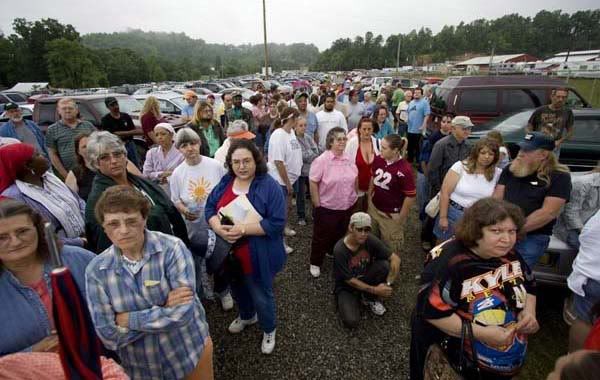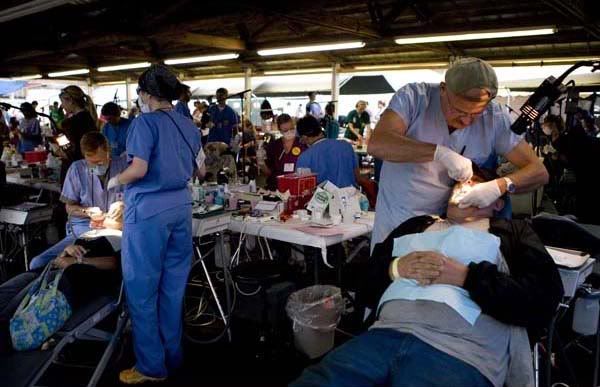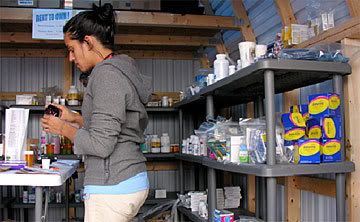In response to all the GOP horror stories of the Canadian Medical System, I repromote this story for your review. This single story is definitively worse than every over blown or fallacious scare story about the Canadian system combined.
If I asked you to guess where the busiest ER in the country was, what places would immediately come to mind?
New York City? Nope- but not a bad guess. Lincoln Medical and Mental Health Center in the Bronx processes approximately 400 triage cases a day, but it’s not even close to the busiest. How about Los Angeles? Close, but no; though USC Medical Center has an average of 500 admissions come through their triage unit a day.
Wow. Tough question, huh? I’ll give you a clue. Examination rooms are converted horse stalls, made into “rooms” by creating walls out of ropes, sheets, and clothing pins. There are sometimes thousands of people in the ER waiting area at a time. Here’s a picture of the waiting area:

Give up?
It’s nestled in the Appalachian mountains in Wise, Virginia, where Virginia, Kentucky, Tennesse, and West Virginia meet. This emergency room has over two thousand triage patient encounters a day, dealing with everything from root canals and diabetic complications, to pregnancies and mental health issues. This is also the only emergency room in the United States where all care provided is a hundred percent free of cost. Some people drive from as far away as Ohio and Alabama just to be able to get free medical care, and it’s often the only medical attention they’ve received in years.
What’s the catch?
The catch is this emergency room is first come, first served basis — and it’s only open for two and a half days every year. Some people spend the night in their cars just to be able to get an appointment — and thousands are still turned away.
And heck, that was last summer. You remember last summer, don’t you? When all we suffered from was a “mental” economic recession? This year promises to be a lot more fun.
Of the 46-million Americans in the United States that do not have health insurance, about one in every 20 live in this small section of our country. Appalachia, for all it’s natural beauty, is home to some of the most debilitating poverty in the United States. That’s why every July, the Remote Area Medical Volunteer Corps, in conjunction with the University of Virginia, holds a two-and-a-half day rural area medical clinic in Wise, Virginia. The Remote Area Medical Volunteer Corps is a non-profit organization based out of Knoxville, Tennessee; since 1985, they’ve been running similar clinics in needy places all over the world — Guyana, South America…and Virginia.
Over the course of these two and a half days, the Virginia/Kentucky State Fairgrounds become a world-class medical facility with a full range of medical services available in ear, nose, and throat (ENT); endocrinology; audiology; obstetrics/gynecology; nephrology; mammography; gastroenterology; HIV/infectious disease; and primary care. A fully functional pharmacy and lab is available on site. For the first time last year, patients had access to ultrasound exams, which were performed by two University of Virginia sonographers. If a diagnosis can’t be made on site, videoconferencing equipment is set up to consult with clinical teams three hundred miles away in Charlottesville, Virginia.

This is the same clinic that, as some of you may remember, one-time Democratic Presidential candidate John Edwards visited while campaigning in Appalachia in 2007. Surveying the scene, he remarked:
How can we live with this in America? This is not OK.
Well, John, you’re right; this isn’t okay. But it’s the way things are, and it’ll only get worse before it gets better.
Last year, over 80 patients received free hearing aids they wouldn’t have been otherwise able to afford. Hundreds of mammograms were provided to patients who had gone years since receiving their last one, if ever. Over 2,000 individual prescriptions were filled, with the knowledge that once the patients ran out of medicine, they wouldn’t be able to get anymore.
One of the most “popular” procedures is elective tooth extraction. That’s right — people choose to have their teeth pulled. Why? Because they understand this clinic is the only time they’ll have access to dental care; even many of those with full health-care insurance don’t have dental insurance. And rather than risk the teeth degrading over time, they elect to have unhealthy-but-salvagable teeth pulled entirely, in order to save themselves the discomfort or financial burden down the road. Of course, financial reasons are hardly the only motives behind these kinds of decisions, as anyone who has tried to navigate through southwest Virginia will tell you.

Last year, over 200 doctors, nurses, medical and nursing students, and other health care professionals from the University of Virginia donated their time to staff this clinic, and the UVA Health System donated approximately $400,000 a day in equipment, supplies, and pharmecutecals — and that’s not counting the contributions of the Remote Area Medical Volunteer Corps or the dozens of other Commonwealth and nationally-based volunteer organizations that donated time and money towards the success of this program. The entire event involves over 1300 volunteers and up to $10 million in contributions.
In recognition of those who sleep outside or in their vehicles to keep their spots in line, free coffee and bagels are handed out overnight, both nights of the event. The health care professionals work long into the night, trying to cram a year’s worth of medical care in one long weekend. Regardless, on Sunday afternoon there are still several hundred people still in line, waiting to be seen, some who have been waiting since the first day of the clinic.
Sadly, it looks like the folks who need this help the most are going to be the ones who suffer the most. Included in the $2.9 billion budget cut signed into law by Governor Kaine was over $24 million aimed at the University of Virginia alone, or approximately 15% of its operating budget. This was tough, of course, but necessary to even have a chance at balancing the state budget. Thankfully, the University has enough of an endowment to enable them to honor their commitments to help operate the clinic this summer. However, they are only one contributor out of many. The majority of the funding for the Remote Area Medical clinics comes from individual donors- people like you and me- and those individual donors are the ones hurting the most from this economic crisis.
Well, I shouldn’t say that; we’re hurting, sure, but most of us are getting by. The people who come to the Remote Area Medical clinic are many times worse off than most of us, because many have never had proper medical care. I could expound on this for hours, but nobody here needs me to wax poetic on the plight of these people, or how the recession is affecting them more severely than ever before. Even in the best of years, as noted above, there are many hundreds of people who wait in line for two-and-a-half days to get a modicum of medical care, and are turned away. Every volunteer who can no longer afford to donate their time, and every dollar taken away from providing supplies and medicine has a cascading effect.
But talk is cheap. If you are able, please, donate to the Remote Medical Area o
rganization– or, even better, if you’ve got some free time this July 24th-26th, and are a medical professional of any kinda, come down to Wise and volunteer your time.
Any help is better than none; any help will help us make up the difference in what has been lost already. And it will have a real effect on people who had nothing well before this economic crisis.
Thank you, and God bless.
Employment statistics helpfully provided courtesy of the US Department of Labor March 2009 jobs report; information on Americans covered by health insurance provided by Kaiser Permanente; thanks to the University of Virginia for contribution information.
Originally published Sun Mar 15, 2009 at 16:22:06 PM EDT
10 comments